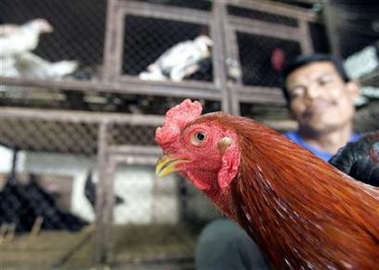Asia-Pacific
Indonesia warns of more bird flu deaths
(AP)
Updated: 2006-07-17 10:58
 |
Large Medium Small |
Culling poultry stocks in areas infected with bird flu is easier said than done, a top Indonesian Health Ministry official said Monday, as the sprawling nation moved closer to becoming the world's hardest hit by the virus.
 A chicken trader waits for customers at the local market in central Jakarta July 16, 2006. A 44-year-old Indonesian who died four days ago has tested positive for bird flu, a senior Health Ministry official said on Sunday, citing a local test. [Reuters] |
Nyoman Kandun also said that Indonesia's bird flu public awareness campaign was still not effective enough.
"We have 230 million people spread across 17,000 islands and some of them just don't care," he told The Associated Press. "Education levels are also poor."
Kandun said that a World Health Organization laboratory had confirmed the bird flu death of a 3-year-old girl, bringing the country's toll from the virus to at least 42, tying it with Vietnam for the most deaths worldwide.
The WHO, however, does not recognize one of Indonesia's bird flu deaths because of the testing method used. The agency, which is coordinating the world's fight against the virus, still lists 41 bird flu deaths in Indonesia.
Bird flu has killed at least 132 people worldwide since it started ravaging Asian poultry stocks in late 2003, according to WHO.
Most people sickened by H5N1 have come into contact with infected birds and it remains very difficult for humans to catch. But experts fear the virus could mutate into a form that spreads easily among people, possibly sparking a pandemic that could kill millions around the world.
Vietnam has not recorded any new human deaths this year, thanks in part to an aggressive campaign to slaughter all birds in infected areas.
Indonesia has been criticized by some for not carrying out widespread culling.
"That (culling) is easy to say, but not that easy to implement," Kandun said.
The country has an estimated 2 billion chickens and the virus is endemic in poultry in 27 of its 33 provinces. Culling all the birds would require a massive amount of compensations to farmers and backyard chicken owners.